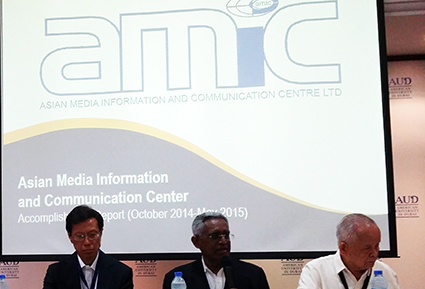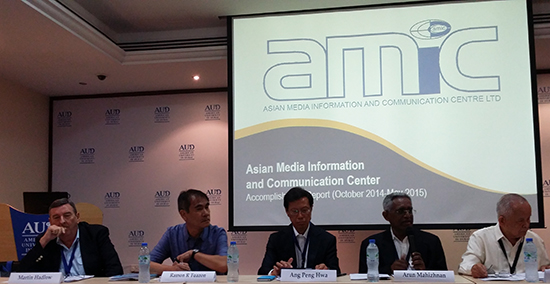
DUBAI (AMIC/Pacific Media Watch): Outgoing AMIC chairman Arun Mahizhnan has challenged Asian communication researchers and advocates to contest the “Western gatekeepers” and establish their own independent identity.
“We must rid ourselves of this blind subservience,” he said, admitting that it would be a difficult task in an era of a global “paper chase for ranking”.
Speaking at the closing ceremony of last week’s Asian Media Information and Communication Centre (AMIC) conference at the American University in Dubai, his message was short and strong.
“Before I take my leave, I just want to say a few words about AMIC's mission,” said Mahizhnan, a special research adviser in the Institute of Policy Studies in Singapore National University’s Lee Kuan Yew School of Public Policy.
“ In my personal view, one of the most important aspects of our mission is to focus on the first word of the name of our organisation - ASIAN.
“While we have, indeed, provided numerous opportunities to share the Asian experience in conferences and workshops and even books, we have a long way go in establishing an Asian perspective and Asian theories of communication.
“This has been a deep concern of mine for quite some time. We have, for far too long, submitted to and submerged ourselves in Western perspective, Western theories, and worst of all, Western validation of our own nascent attempts to create anything Asian.
“We must rid ourselves of this blind subservience.
Challenges ahead
“But unfortunately, it is going to be even more challenging to do this now than before. For one thing, many of our universities have embarked on a paper chase for ranking and citation that will certainly focus the minds of many of our best and the brightest on getting past the Western gatekeepers.
Another – even bigger - challenge was the advent of global communications which was increasing by the day and sweeping across a world that seemed to be homogenising all the time.
“But personally, I don't believe that to be the case. I think there is a clear research agenda ahead for us.
“How do we differentiate and distinguish Asian communication practices and build theories based on them? I have seen a number of attempts in the past and even in this conference there were papers that were strongly grounded in local practice though, again, some were trying to fit them to Western theories.”
Mahizhnan reminded AMIC participants that communication theories were not invented by scholars sitting in laboratories but through observation and analysis of practice.
Some were seriously observing and analysing Asian practice.
“We need more such people. We need more work on this area.
“So my final plea to the members and managers of the Asian Media Information and Communication Centre is to focus more on the first word in our name. Let this name be not taken in vain.”
Arun Mahizhnan has stepped down as chair of AMIC and the organisation’s secretariat is moving from Singapore to Manila, Philippines.
Elected new chairman is prolific Filipino communications scholar and author Dr Crispin C. Maslog, one of the founders of AMIC 44 years ago. Secretary-general is Dr Ramon R. Tuazon.

This work is licensed under a Creative Commons Attribution-NonCommercial 3.0 New Zealand Licence.




